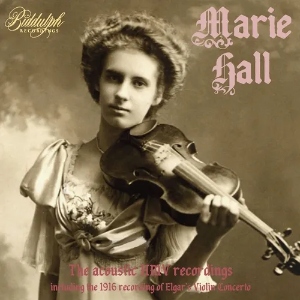
Marie Hall (violin)
The Acoustic HMV recordings
rec. 1904-1924
Biddulph 85062-2 [82]
Marie Hall (1884-1956) was one of Britain’s best violinists in the first quarter of the twentieth-century, part of a generation that produced Albert Sammons, Arthur Catterall and May Harrison amongst other leading native fiddlers. A student of Ševčik in Prague, her career began triumphantly in 1903, continued the following year with her first recordings for G & T, rose again when she was selected to perform Elgar’s Violin Concerto with the composer conducting in 1912, and won the dedication of Vaughan Williams’ The Lark Ascending. She recorded from 1903 to her final, acoustic discs for HMV in 1924. Like her near-contemporary, the Australian-born Daisy Kennedy, she made no commercially released electric recordings, and their careers reflect a similar trajectory – intense initial success, then dropped by their recording companies in the 1922-24 period, followed by a genteel retreat from the limelight. In Hall’s case her career carried on but in a more domestic sphere – her last Prom came in 1931 and she and her daughter Pauline toured as a duo and continued to broadcast for the BBC until the 1950s.
I well remember the intemperate verdict of the doyen of American violin critics, Henry Roth, who wrote something along the lines that Hall’s Elgar recording was ‘horrendous’ and that it ‘could only serve to embarrass her memory’. It makes one wonder if he’d listened past her opening few bars – which he must have – as they are indeed subject to her very slow and obtrusive portamenti which, allied to her limited vibrato and use of gut strings, give a rather sickly start to the concerto. Once past that, though, things improve greatly and the truncation, which is well-known from previous restorations (on Pearl and Music & Arts), and which includes Elgar’s imaginative use of the harp, gives a resilient account of the impression she must have made in concerto performance.
With the exception of this 1916 recording, which was HMV’s riposte to Columbia’s earlier recording of a 16-minute truncation by Sammons and Henry Wood which is now on Biddulph as well – and the piano-accompanied finales from Mendelssohn’s Concerto and Saint-Saëns’s Symphonie espagnole – everything in her recorded legacy is a sweetmeat or character piece. She was one of the first to record the music of Alfred d’Ambrosio whose Canzonetta and Romance she plays adeptly through not with overmuch warmth – chaste rather than expressive. Ries’ Perpetuum mobile is dispatched with dextrous sang froid as is Fiocco’s once-celebrated ‘Allegro’. In Raff’s Cavatina her vibrato is too slow to do the piece justice but the cod-baroquerie of Girolamo de Angelis’ Gigue sits nicely for her. Her Paganini and Sarasate are vigorous and stylish, her Tor Aulin attractively paced with requisite esprit.
There was a gap of six years after her 1918 Sarasate disc before she resumed recording in a two-day series in February 1924, her last sessions, that saw the publication of five sides. Dvořák’s Humoresque is withdrawn and reserved and wholly at odds with the tonal production of the new generation of tonalists – from Elman and Seidel to her compatriot Sammons. Her last recordings were of a brace of British pieces, Goossens’ Old Chinese Folk Song – dextrously played but limited expressively – and Holst’s Valse-étude.
It’s unfortunate that by the time that HMV recorded The Lark Ascending later in the 1920s, Hall had been dropped and the splendid Isolde Menges played, with Malcolm Sargent conducting – this is available now on Biddulph as well.
Raymond Glaspole has transferred his first-class copies and Rick Torres has digitally remastered them. Tully Potter has compiled the notes. This is the first disc devoted exclusively to Marie Hall’s complete recordings and the totality of her achievement can be appreciated throughout the 82 minutes. She was in no way ‘horrendous’. In fact, she was an admirable if stylistically and tonally rather anachronistic performer, sitting at the cusp of the emerging new school of tonalists. Though it may be largely of interest only to specialists, this disc reminds us of the variety of playing styles to be encountered in this period and is a worthy salute to Marie Hall’s memory.
Jonathan Woolf
Contents
Edward Elgar: Violin Concerto in B minor, Op.61 (abridged)
Camille Saint-Saëns: Le Cygne
Alfred d’Ambrosio: Canzonetta, Op.6
Franz Ries: Perpetuum mobile, from Suite No.3 in G, Op.34 No.5
Wolfgang Amadeus Mozart: Minuet, from Divertimento in D, K.334 arr Burmester
Felix Mendelssohn: Finale, from Concerto in E minor, Op.64
Joseph-Hector Fiocco: Allegro, from Suite No.1 in G arr O’Neill
Fritz Kreisler: Minuet ’in the style of Porpora’
Joachim Raff: Cavatina in D major, Op.85 No.3
Franz Schubert: Moment musical, D790 No.3
Girolamo de Angelis: Gigue, Op.2
George Frideric Handel: Bourée, from Sonata in F, BWV363a
François Schubert: L’Abeille, Op.13 No.9
Johann Sebastian Bach: Gavotte, from Partita No.3 in E arr Kreisler
Niccolo Paganini: Moto perpetuo, Op.11
Tor Aulin: Humoreske, from Four Aquarelles, No.2
Jean-Marie Leclair: Sarabande and Tambourin arr Sarasate
Édouard Lalo: Finale, from Symphonie espagnole, Op.21
Alfred d’Ambrosio: Romance, Op.9
Pablo de Sarasate: Jota Aragonesa, Op.27
Antonin Dvořák: Humoresque, Op.101 No.7
Fritz Kreisler: La Precieuse ‘in the style of Louis Couperin’
Ludwig van Beethoven: Minuet in G, WoO10 No.2 arr Burmester
Eugene Goossens: Old Chinese Folk Song
Gustav Holst: Valse-étude
Tracks 1-3 with Orchestra/Edward Elgar, tracks 4-21 with unidentified pianist: track 22 with Harold Craxton (piano): tracks 23-25 with Charlton Keith (pianist): tracks 26 and 27 with Marguerite Tilleard (piano)
Buying this recording via a link below generates revenue for MWI, which helps the site remain free



















